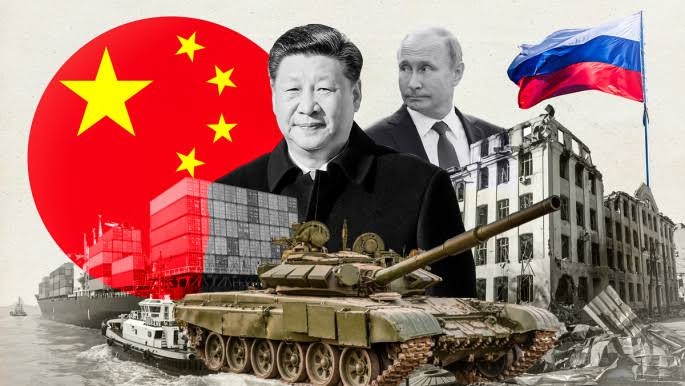Global Tensions Rise: China Accused of Supporting Putin
The call by NATO for China to be punished if China continues supporting Russia demonstrates an increasing urgency within the alliance to confront the multifarious challenges posed by the Russia-China alliance.

Beijing's Balancing Act
China's actions were criticised as "trying to get it both ways," pointing out contradictions in its measures and even insinuating that its current policy will not last. This, in NATO's view, just cannot go on for the long haul.
China has been providing Russia with advanced critical technologies, including micro-electronics, that are used in the production of missiles and other armaments against Ukraine.
Although Beijing has denied supplying lethal arms to Moscow, the continuous provision of dual-use items is strongly irking Western nations.
At least NATO has given a veiled reference to the economic consequences of China's non-compliance with the required change; economic costs may be considered if there is no change of behaviour on the part of China.
International Response to Russia's Aggression
This position has been taken at a time when Russia is not giving any signals to reduce its conflict with Ukraine. In a recent peace summit, most countries showed much support for Kyiv, but Russia dismissed it as a futile exercise and maintained it would only engage in peace talks if Ukraine capitulated.
Now, NATO and its partners are discussing various measures to impose on China to deter it from giving any more support to Russia.
The US initiated some preliminary measures last month by imposing restrictions on about 20 firms in China and Hong Kong. These steps will be taken to prevent the inflow of crucial technologies into Russia, which affects its war potential.
The Kremlin's Alliances
These discussions come with the Kremlin's assertion of the planned visit by the leader to North Korea, having just visited China. The said visits signal Russia's growing inclination towards other countries with authoritarian rule because it finds itself increasingly isolated in the world arena for its actions in Ukraine.
Currently, Russia is turning more and more to authoritarian leadership, particularly in Iran, China, and North Korea. North Korea has supplied artillery shells to Russia in exchange for the latest technology with which it has upgraded its missile and nuclear programs. That is to say, North Korea is aiding Russia to fight an aggressive war against Ukraine.
Strategic Shifts and NATO's Stance
The position of NATO reflects a shift in strategy by the alliance as it grapples with Russian aggression and Chinese support. Since Russia invaded Ukraine entirely, there has been a growing stronger relationship between Moscow and Beijing, which has significantly changed the balance of power in Eurasia.
Western countries are becoming more cautious about this alliance that is developing between these two states. In case China goes on supporting Russia, then NATO will take tough measures against it. The call for potential economic sanctions shows that the alliance is contemplating all its options to force Beijing into changing its mind.
NATO’s position is part of the broader strategic pivot being witnessed within the Alliance: how to respond to Russia’s assertiveness in future and China’s support today. Naturally, their relation grew deeper when Russia went to war with Ukraine in 2022, and this radically altered the geopolitical balance across Eurasia.
Western nations are increasingly leery of this deepening alliance. "NATO is prepared to take a firmer stand against China if it continues helping Russia." These talks on possible economic sanctions indicate that no stone will be left unturned by the alliance as they seek ways of making Beijing change its mind.
Broader Implications
Other critical issues, such as nuclear weapons and defence spending, were also addressed. These topics are particularly pertinent as NATO countries seek to bolster their defences in response to growing threats from both Russia and its allies.
The alliance is keenly aware of the need to modernise its forces and ensure that member states are adequately prepared to face any potential escalation. Increased defence spending and enhanced military cooperation among NATO members are likely to be key components of this strategy.
Conclusion
The call by NATO for China to be punished if China continues supporting Russia demonstrates an increasing urgency within the alliance to confront the multifarious challenges posed by the Russia-China alliance.
The continuation of war in Ukraine without a foreseeable end presents a tough choice for international communities on how to deal with nations supporting aggression and destabilising global peace.
Possible economic sanctions against China signify a major intensification in efforts by Western states aimed at isolating Russia and its allies.
Therefore, while navigating this complex geopolitical terrain, one key emphasis will be on maintaining cohesion among partners so as to put pressure on wrongdoers enabling conflicts.


